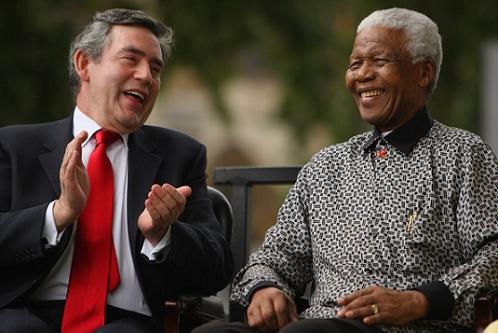Nige examines a 19th Century poem that has experienced a sudden revival in popularity, having been cited as an inspiration by both Nelson Mandela and, um, Gordon Brown…
My father’s taste in poetry was that of an upright Edwardian. He had a personal anthology of poems of moral uplift and patriotic heroism which he delighted in reciting while shaving. Vitai Lampada was of course a favourite, as were The Revenge (‘Sink me the ship, Master Gunner – sink her, split her in twain! Fall into the hands of God, not into the hands of Spain!’), The Loss of the Birkenhead and Horatius at the Bridge (‘even the ranks of Tuscany could scarce forbear to cheer’).
These kind of poems were still to be found in the older anthologies of my childhood, but were soon to fade away… Or were they? The sudden vogue of W.E. Henley’s Invictus suggests some at least of these poems have a long afterlife and are liable to flare into renewed vigour and popularity even now. Invictus gave its name to the 2009 Clint Eastwood film about Nelson Mandela, just as the poem, on a scrap of paper, gave strength to the prisoner Mandela.
John McCain claimed the poem as a source of personal inspiration – as did (gawd help us) Gordon Brown. Why is this? It is a very effective poem of its type, technically well done, full of memorable phrases, with a message that I suspect bordered on the subversive when it was published (1875) since it proclaimed man free from God (gods now plural and dubious), in control of his own destiny and fearing no afterlife or judgment.
Now, however, it is one that stiffens the sinews of the individualist captain of his soul, at best in a way that will strengthen a good man (Mandela), at worst as a kind of archaic equivalent of My Way (Gordon Brown). Either way, it seems it’s back. For a while.
Invictus – William Ernest Henley, 1875
Out of the night that covers me,
Black as the Pit from pole to pole,
I thank whatever gods may be
For my unconquerable soul.
In the fell clutch of circumstance
I have not winced nor cried aloud.
Under the bludgeonings of chance
My head is bloody, but unbowed.
Beyond this place of wrath and tears
Looms but the Horror of the shade,
And yet the menace of the years
Finds, and shall find, me unafraid.
It matters not how strait the gate,
How charged with punishments the scroll.
I am the master of my fate:
I am the captain of my soul.












saw the film (invictus) last week, total tosh. I learnt the poem at prep school and embarrasingly as a teenager I did once toy at length with the idea of having ‘I am the master of my fate’ tattooed across my lower back… :/ (which was then superceded by the idea of having pink floyd’s ‘shine on you crazy diamond’….neither of which thankfully made the final cut
I wonder whether your father encountered Henley’s 1892 effort; ‘The Song of the Sword’, which celebrated the weapon as ‘Clear singing, clean slicing; / Sweet spoken, soft finishing; / Making death beautiful… / Arch-anarch, chief builder, / Prince and evangelist, / I am the Will of God: / I am the Sword’, a work that elicited the less than awestruck review: ‘No you’re not; you’re only an Ancient Pistol.’
However Henley did achieve two useful things: he provided the inspiration for his friend Stevenson’s creation Long John Silver and helped out John Farmer with his dictionary Slang and its Analogues (7 vols, 1890-1904).
I think even my father might have drawn the line at that one Jonathan – but yes its great to think of Henley’s afterlife as Long John Silver…
Worm – The best advice to anyone at any time contemplating a tattoo remains ‘Don’t!’
I can imagine the poem being read by a Salvation Army sergeant, his troop having formed a semi circle, under the gaslight, outside of the Gospel Hall. at the end of a fog shrouded cobbled street, then some hymns, a collection and back home to bread and dripping.
Apparently, Timothy McVeigh, the Oklahoma City bomber, had this recited just before his execution.
JL – How long can we leave it before everyone’s forgotten this post and we can have the quiz question: What do Nelson Mandela, Gordon Brown and Timothy McVeigh have in common?